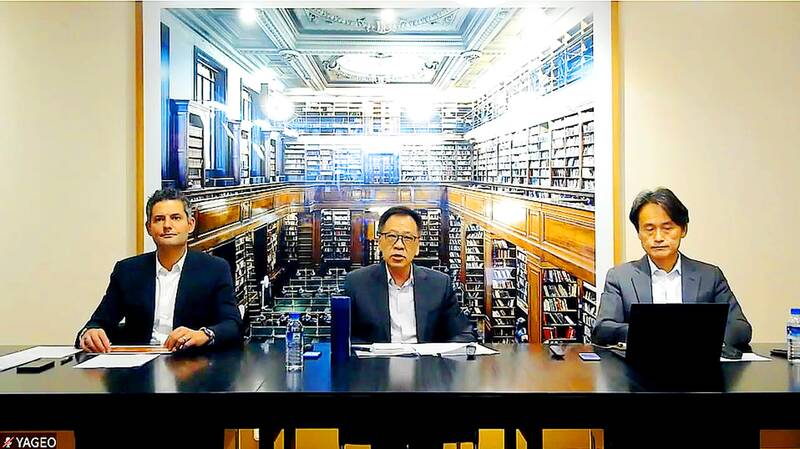Yageo Corp (國巨), the world’s third-largest supplier of multilayer ceramic capacitors (MLCCs), yesterday projected that its revenue would be little changed this quarter and the next on a sequential basis, as signs of an exuberant recovery are lacking.
With a lukewarm increase in end-market demand, the passive components maker expects channel inventory adjustments to continue for another one to two quarters.
Yageo’s conservative outlook came as the firm reported its weakest profit in nine quarters last quarter.

Photo: Chang Hui-wen, Taipei Times
Net profit for the April-to-June quarter tumbled 37 percent to NT$3.73 billion (US$119.15 million), from NT$5.93 billion in the same period last year. That represented a decline of 9.7 percent from NT$4.13 billion a quarter earlier.
“The current market [condition] seems to have reached the bottom. However, we haven’t seen signs of very strong demand yet,” Yageo CEO David Wang (王淡如) told an online investors’ conference.
Revenue would be flat this quarter compared with NT$26.76 billion a quarter earlier, Wang said, adding that gross margin would be flat, or improve slightly from 33.2 percent last quarter.
Overall, Yageo expects to generate more revenue in the second half of the year than the first half, Wang said.
To cope with tepid market demand while reducing its inventory further, Yageo would extend its one-year factory utilization control policy into this quarter, the company said.
The day-of inventory gauge stood at 129 days last quarter, higher than the firm’s target of fewer than 120 days, it said.
The utilization of manufacturing equipment for premier passive components would remain at about 70 percent this quarter — the same as last quarter, Yageo said, adding that the usage of manufacturing equipment for commodity-type products would be 40 to 50 percent.
Yageo said it has recently seen signs of a recovery in its MLCC business, as customers have started restocking inventory lately.
The company’s MLCC business was its second-largest revenue contributor last quarter, accounting for 22 percent of its total sales.
Demand from the car, electric vehicle and industrial segments would remain robust in the second half of the year, extending the growth recorded in the first half, Yageo executive vice president of global sales and marketing Claudio Lollini said.
However, the demand profile for desktop computers, notebook computers and smartphones remains lackluster, Lollini said.
Yageo did not see any major decline in its average selling prices, aside from seasonal adjustments, he added.
Lollini said it would be difficult to quantify how many business opportunities the adoption of artificial intelligence chips would bring to the company, but it is certain that each AI server is equipped with many more components than a traditional server.
Yageo’s MLCCs and chip resistors have exposure to the AI market, he added.

SEMICONDUCTORS: The German laser and plasma generator company will expand its local services as its specialized offerings support Taiwan’s semiconductor industries Trumpf SE + Co KG, a global leader in supplying laser technology and plasma generators used in chip production, is expanding its investments in Taiwan in an effort to deeply integrate into the global semiconductor supply chain in the pursuit of growth. The company, headquartered in Ditzingen, Germany, has invested significantly in a newly inaugurated regional technical center for plasma generators in Taoyuan, its latest expansion in Taiwan after being engaged in various industries for more than 25 years. The center, the first of its kind Trumpf built outside Germany, aims to serve customers from Taiwan, Japan, Southeast Asia and South Korea,

Gasoline and diesel prices at domestic fuel stations are to fall NT$0.2 per liter this week, down for a second consecutive week, CPC Corp, Taiwan (台灣中油) and Formosa Petrochemical Corp (台塑石化) announced yesterday. Effective today, gasoline prices at CPC and Formosa stations are to drop to NT$26.4, NT$27.9 and NT$29.9 per liter for 92, 95 and 98-octane unleaded gasoline respectively, the companies said in separate statements. The price of premium diesel is to fall to NT$24.8 per liter at CPC stations and NT$24.6 at Formosa pumps, they said. The price adjustments came even as international crude oil prices rose last week, as traders

SIZE MATTERS: TSMC started phasing out 8-inch wafer production last year, while Samsung is more aggressively retiring 8-inch capacity, TrendForce said Chipmakers are expected to raise prices of 8-inch wafers by up to 20 percent this year on concern over supply constraints as major contract chipmakers Taiwan Semiconductor Manufacturing Co (TSMC, 台積電) and Samsung Electronics Co gradually retire less advanced wafer capacity, TrendForce Corp (集邦科技) said yesterday. It is the first significant across-the-board price hike since a global semiconductor correction in 2023, the Taipei-based market researcher said in a report. Global 8-inch wafer capacity slid 0.3 percent year-on-year last year, although 8-inch wafer prices still hovered at relatively stable levels throughout the year, TrendForce said. The downward trend is expected to continue this year,

Taiwan Semiconductor Manufacturing Co (TSMC, 台積電), which supplies advanced chips to Nvidia Corp and Apple Inc, yesterday reported NT$1.046 trillion (US$33.1 billion) in revenue for last quarter, driven by constantly strong demand for artificial intelligence (AI) chips, falling in the upper end of its forecast. Based on TSMC’s financial guidance, revenue would expand about 22 percent sequentially to the range from US$32.2 billion to US$33.4 billion during the final quarter of 2024, it told investors in October last year. Last year in total, revenue jumped 31.61 percent to NT$3.81 trillion, compared with NT$2.89 trillion generated in the year before, according to